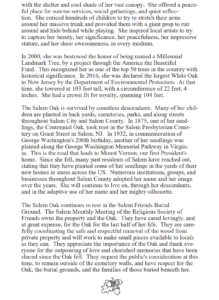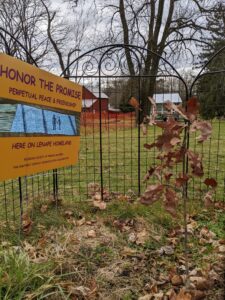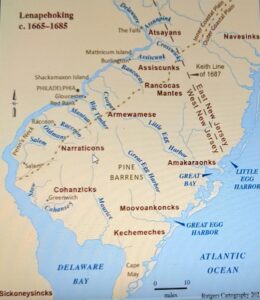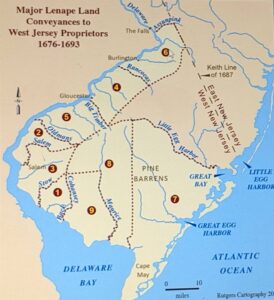SQ IAC MENU: Provenance / Love Thy Sovereign Nation Neighbor / Allyship / Call To Action
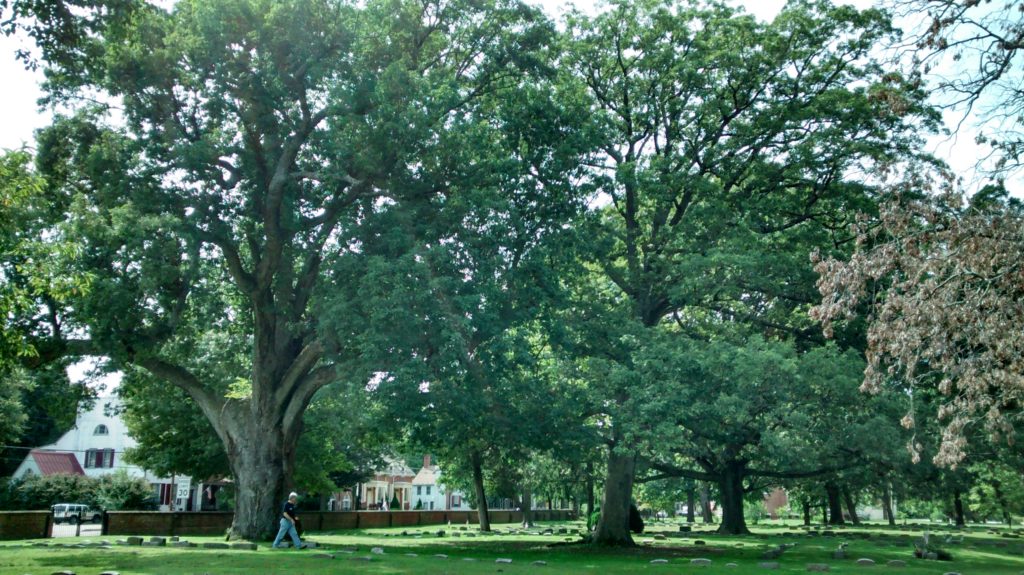
Lenape Sacred Oak, known as The Salem Oak, Salem Friends Burial Ground, Salem, NJ, ©sbM, ALL RIGHTS RESERVED
Seek Peace and Pursue It. Psalm 34:14
Fenwick’s Colony
In Autumn of 1675, departing England aboard The Griffin, John Fenwick arrives in Scheyichbi, Lenapehoking. Before winter, Lenape sachems gathered beneath the branches of their ~255 years mature Sacred Oak Tree and treatied with John Fenwick, who’d asked for land toward creating a colony for the Religious Society of Friends of Truth.
Lenape sachems, Chiefs Tospaminkey and Henaminkey, who had the dispositions of lands within Forcus and Mosacksa creeks, convein with Fenwick; land was acknowledged and provided intentionally; that land is now known between Salem and Oldmans Creeks.
The following season, early 1676, Lenape heard a second ask for lands between Forcus and Canahockink creeks. Fenwick met with sachems of that land – Chiefs Mahoppony, Alloways, Necomis and his mother Necosshehesco, Myhoppony, and Shuccotery. These sachems acknowledged and provided more land for Fenwick’s Colony; this land is now known between Salem and Cohansey Creeks.
Lenape heard a third ask that season, this time for lands from Canahockink creek to the Wahatquenack river. Chiefs Mahawskey, Mohutt, Newsego, Chechenaham, Toruche, and Shank A Num met with Fenwick, acknowledged the request, and deeded land; this land is now known between Cohansey Creek and Morris River.
Lenape Indians of Scheyichbi welcomed wayfarers to Scheyichbi and with Fenwick held intentions for “perpetual peace and friendship,” origins bound by the words, as long as the sun shines and the rivers run, we shall bind our hearts to yours. Fenwick, as proprietor of one-tenth of land known by European colonists as West Jersey, subsequently surveyed and deeded lands to fellow immigrants. More deeds are posted here.
Lenape Sacred Oak Treaty Tree
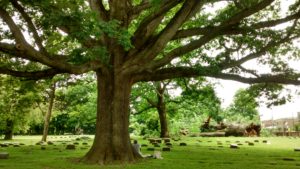
Daughter Oak & felled Sacred Oak, 2019, Salem Friends Burial Ground, Salem, NJ ©sbM, ALL RIGHTS RESERVED
Based on the age of the Sacred Oak Tree when she felled and oral history, this Lenape Treaty tree may have sprouted ~1420 A.D, being about 255 years mature during Lenape: Fenwick Colony treaty making. At the time she felled, occasioned on a quiet evening, 6pm, 6th day Sixth month, 2019, it is estimated that she was ~600 years mature. Her “natural” daughters, daughter’s daughters, and propagated daughters continue the living ‘story, literally and figuratively rooted throughout the Scheyichbi region of Lenapehoking, and beyond. Her story is their story too.
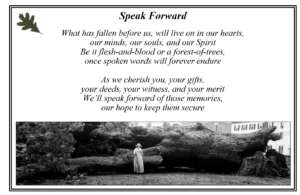 Fall Foliage Lovers Enjoy NJ’s Largest Oak In Salem County
Fall Foliage Lovers Enjoy NJ’s Largest Oak In Salem County
Famous ancient New Jersey oak tree collapses
Originally posted in Salem Quarter News, Summer 2019, Speak Forward (poem) and Day After (photo) © Jim Murphy; and The Mighty Salem Oak story.
The Mighty Salem Oak 1419-2019, originally posted in Salem Quarter News Summer 2019, pages 14 & 15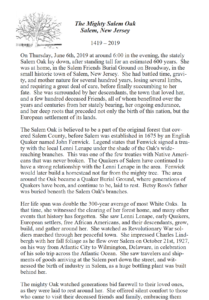
Our SQ IAC Story
After hundreds of years on this land, contemporary Friends, now known as Salem Quarter, are positioned with decades of attendance with sovereign Native Nations’ public Powwows on their Lenape ancestral homeland. Friends of Salem Quarter accept invitations by the Nanticoke Lenni-Lenape Tribal Nation to gatherings at their Cohanzick Tribal Grounds. With seasoned discernment, in the Spring of 2011, Salem Quarter met with approval to establish an Indian Affairs Committee, recognizing acts in progress with the aforementioned, most local sovereign Nation. The primary dual mission with the tribe is to strengthen our relationships, as led, bringing forth our gifts – honoring the promise.
SQ Friends are cheerfully walking, listening, loving, and making joyful noise, celebrating together with Lenape who have remained in continuous relationship with their homeland, Lenapehoking. Mutual acts of beneficial engagement between our communities include interfaith worship sessions, attending public Powwows, accepting invitations to non-public social and ceremonial Gatherings, examination of Friends’ history, and acknowledging pre-dominant cultural biases. Given Friends guiding testimonies and practices, we wonder, how might Light within guide Friends toward righting relationships with sovereign Nations?
In June 2011, Salem Quarter Nominating Committee named the first slate of Indian Affairs Committee members, noting that the terms were not established, and that future members were to be nominated by the Indian Affairs Committee, seeking approval by the Quarterly Meeting body; this remains our process. The committee is an “open” committee, with “set” meetings prior to Quarterly business and “called” meetings as way opens.
We Are On Indigenous Land: We Are Treaty People
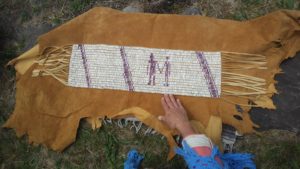
Treaty of Amity Wampum Belt crafted by Lone Bear Revey (Lenape) gifted to The Religious Society of Friends, Philadelphia Yearly Meeting (1995) © 2017 Jim Murphy ALL RIGHTS RESERVE
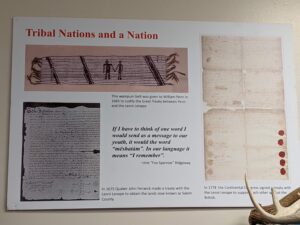
“Too often, when American Indian Culture is presented, it is as though it belongs only to the remote past…Too often, our people are spoken of as though we no longer exist in New Jersey and the surrounding states…Too often, others have spoken about us, but without regard to us… For too long, our voices have not been heard…” ~www.nativenewjersey.org
Lenape & Friends in Historic West Jersey
Jean R. Soderlund, historian, author, and Professor Emeritus of Lehigh University, spoke with Friends in March 2022. Jean’s talk, From Shackamaxon Island to Haddonfield – Quakers & Lenapes in Early NJ, represents her research of Lenape living along the Cooper River and Timber Creek region (including present day Camden, NJ) who resisted full-scale colonization for decades, remaining sovereign through peaceful conflict resolution – protecting personal and religious liberty while avoiding violence.
Though Friends share these values, the epidemics and colonists’ greed for land resulted in the decline of Armewamese towns similar to patterns in militarized colonies such as Virginia, Massachusetts and New Netherland.
IAC Reports are posted on Salem Quarter News
SQ IAC Contact information:
- email: SacredWovenWord@yahoo.com
- call/ voice message: 609 732-0576
Provenance / Love Thy Sovereign Nation Neighbor / Allyship / Call To Action
Photographs used with permissions, artists ©, ALL RIGHTS RESERVED.
